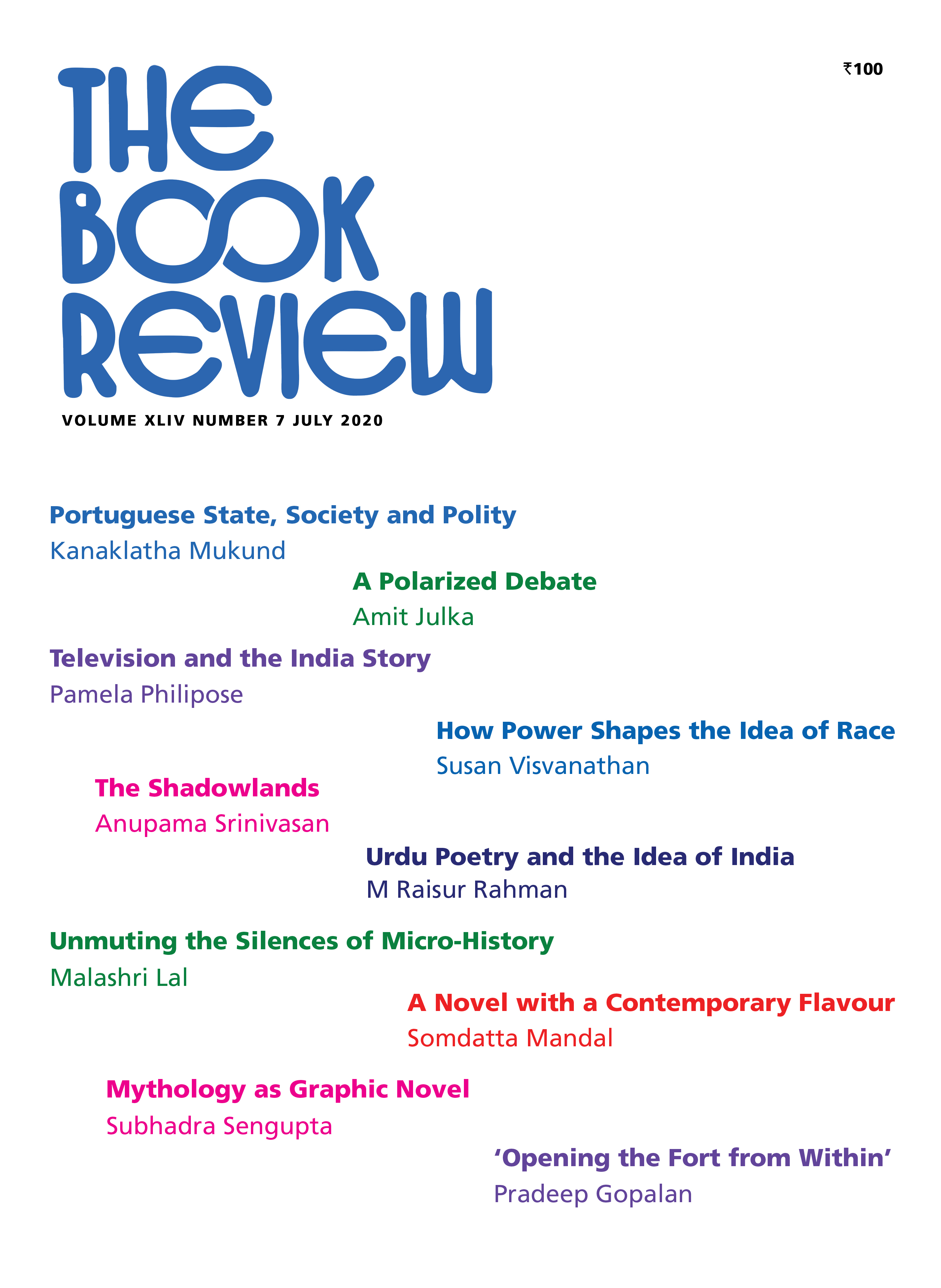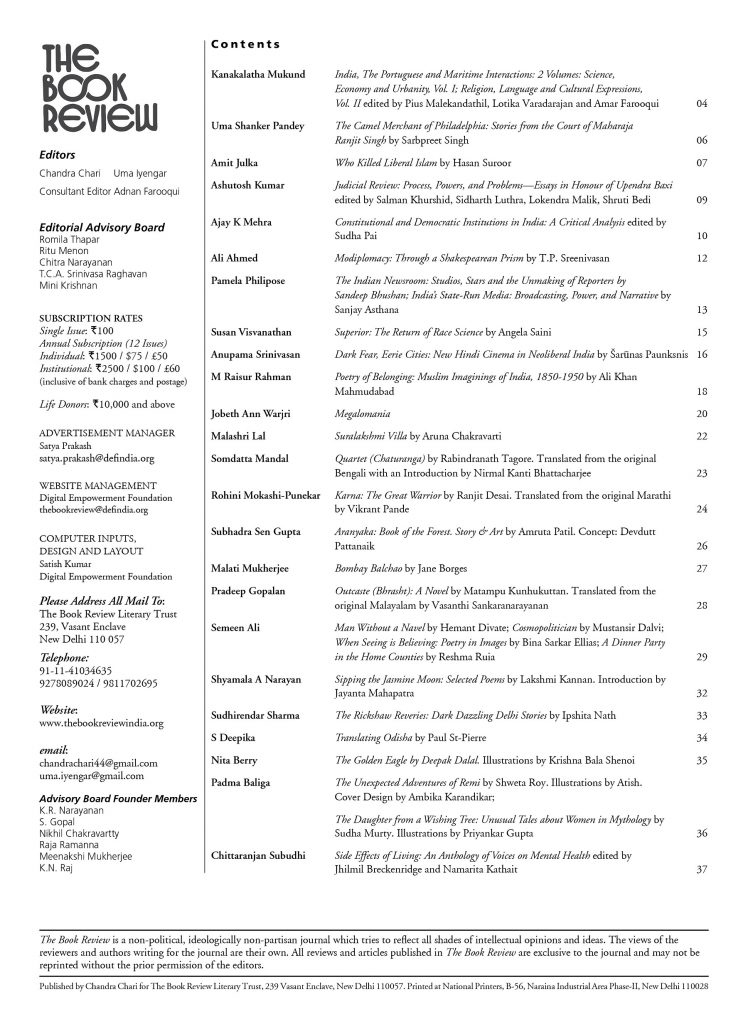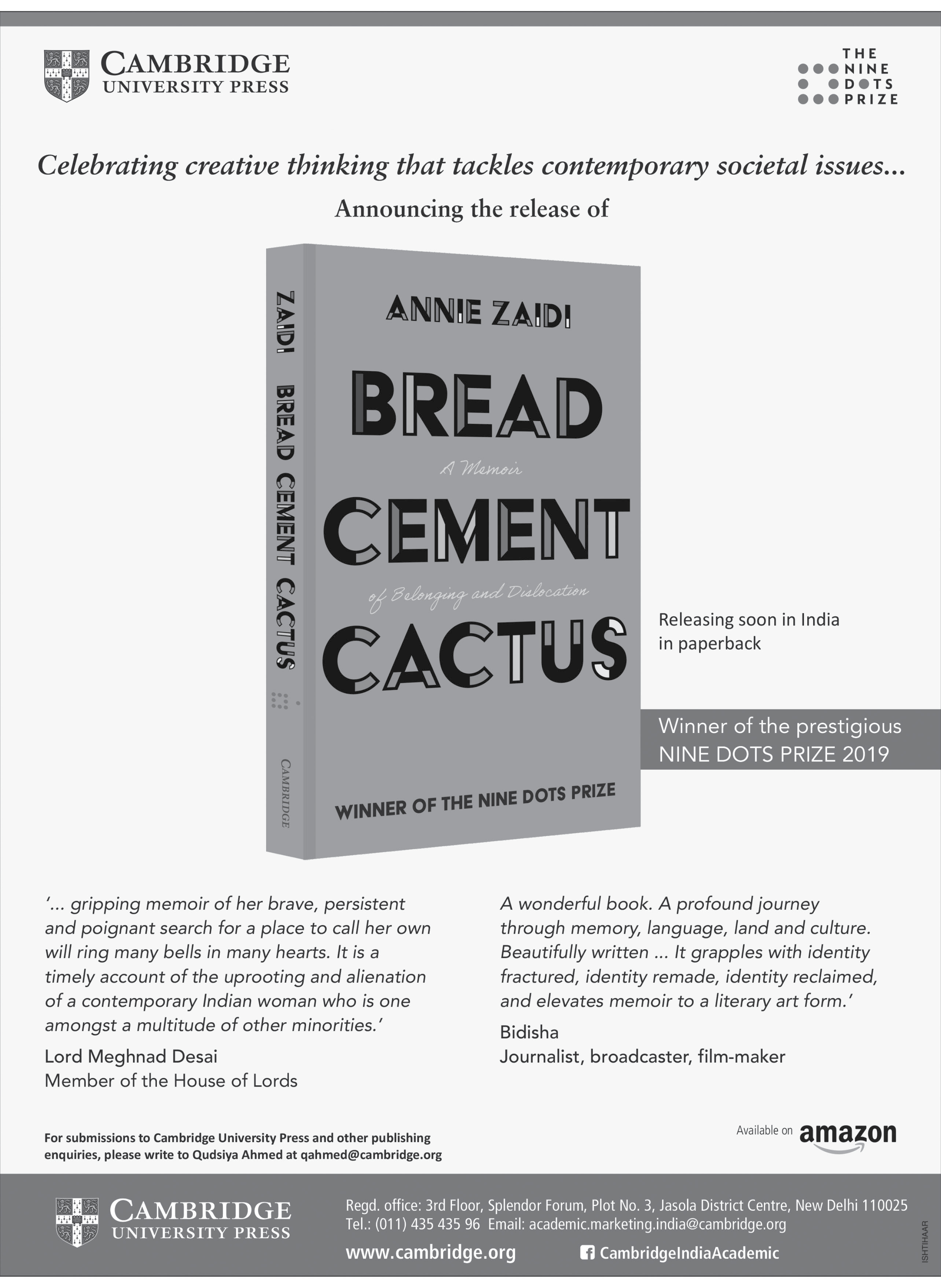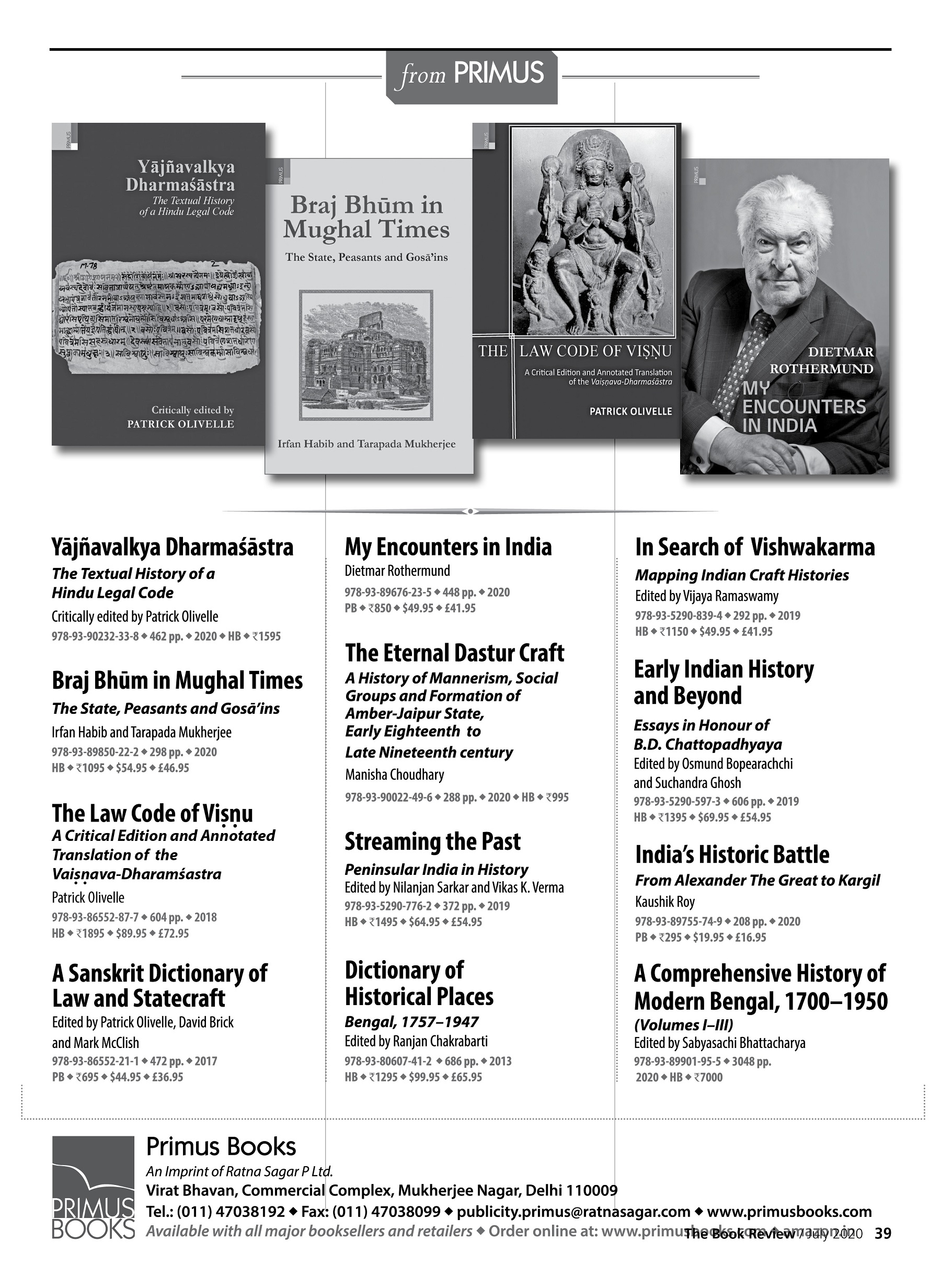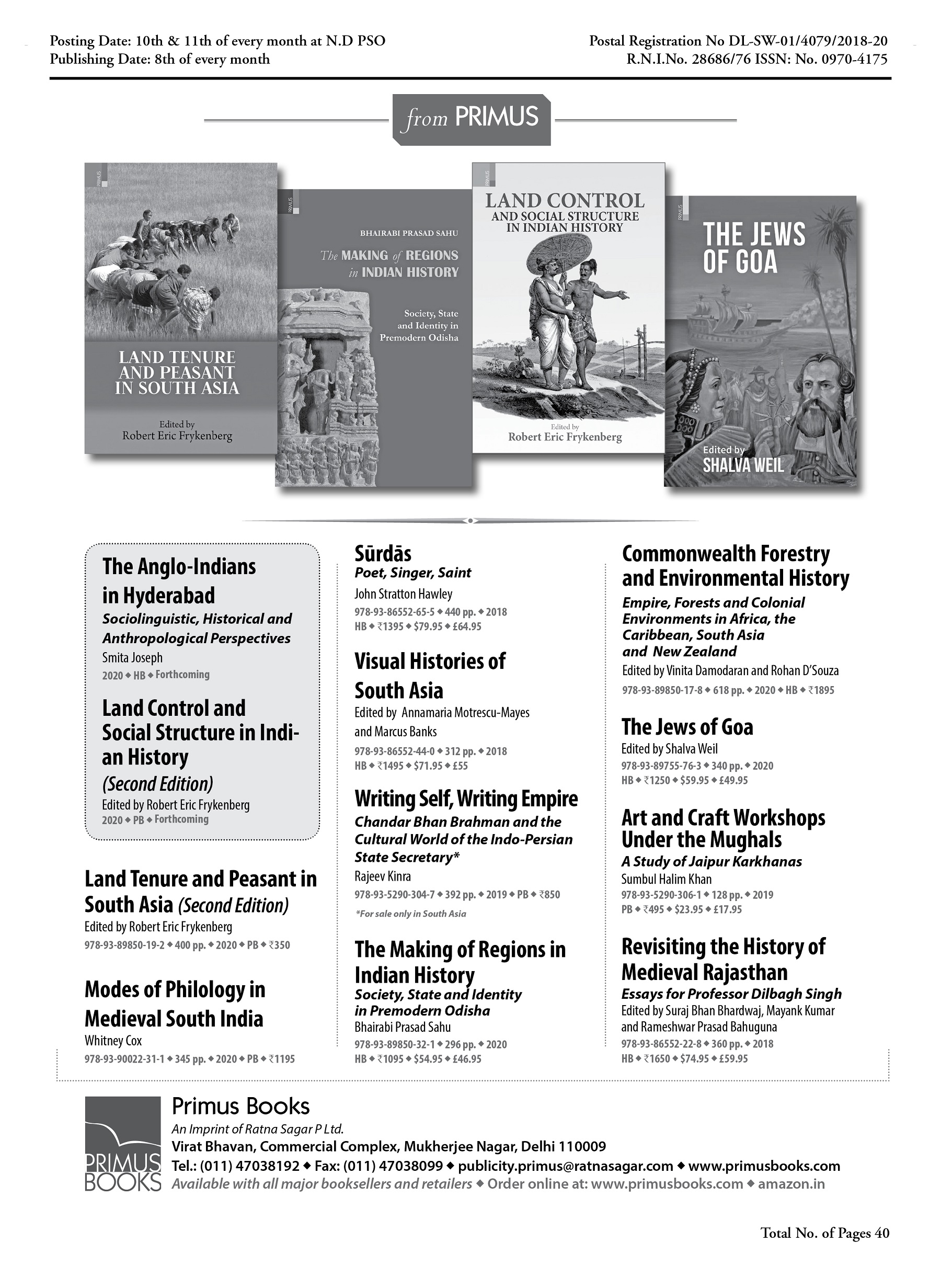The sixty papers published in these two volumes were all presented at the 14th International Seminar on Indo-Portuguese History (ISIPH) held at Delhi in 2013. The first of these seminars was held at Goa in 1978 on the initiative of the late Father John Correia-Afonso.
CURRENT ISSUE
VOLUME XLIV NUMBER 7 July 2020
The book under review, <em>The Camel Merchant of Philadelphia,</em> is a fascinating account of the life and times of Maharaja Ranjit Singh, the architect of the formidable Sikh State in the first half of the 19th century. While the rest of India.
HHasan Suroor’s latest offering, provocatively titled <em>Who Killed Liberal Islam,</em> seeks to delve into the apparent decline of liberalism within the Indian Muslim community. The author places the responsibility of this decline primarily on the shoulders.
The essays for the edited volume have been written in honour of Upendra Baxi, one of India’s leading law teachers and an eminent scholar of constitutional law. As is globally known, in his long illustrious career as a university law teacher.
The book under review, studying public institutions in India follows Rethinking Public Institutions in India edited by Devesh Kapur, Pratap Bhanu Mehta and Milan Vaishnav (OUP 2017). Grouped in five parts, the volume examines sixteen institutions, aside from analysing methodologies for studying institutions.
The book’s title intrigues. The author early on in the book explains it thus, ‘I began to see the pattern of a Shakespearean play, consisting of early successes, some complications, a climax, the emergence of a major event or character which changes.
New York University Professor Arvind Rajagopal has observed that television is an important avenue through which new modes of exercising power are being practiced. The two books under review provide insights into the Indian version of this phenomenon.
In this fascinating account of the history of humans on planet earth, Angela Saini pushes the story of evolution back to 200,000 years, (instead of the more frequent ‘45,000 years ago’), and presses for a diffused history of mankind, rather than a linear evolutionary model.
The book Dark Fear, Eerie Cities analyses a particular strand of Hindi films from the past two decades and through them leads us through a fascinating enquiry into the sources and manifestation of desire, anxiety, fear and neurosis in the new Indian.
We inhabit an era in which we take for granted both nations and national histories that are very recent creations in the large swathes of time. Not to speak of postcolonial states like India that became independent as late as the mid-twentieth century.
Suralakshmi Villa, titled after the eponymous heroine of this novel, is a remarkable witness to an inter-generational story that speaks to urban India. A drive around the older neighbourhoods of New Delhi or Kolkata would bring us in view of stately.
Originally serialized in the magazine Sabjupatra in 1915, Rabindranath Tagore’s Chaturanga (Quartet) is a short novella set in 19th century Bengal. Later it was published in book form in 1916 and is considered a landmark in Bengali literature.
Any survey of modern Marathi literature from the mid-19th century onwards is bound to show up its fascination for and engagement with historical and mythological subjects whether in drama or fiction. In the wake of the Dramatic Performances Act imposed.
In the Rig Veda the rishi-poets reserved the sun and moon, the sacred fire, thunder and lightning for the macho male gods and only gave the forests to a goddess—Aranyani. In a beautiful hymn she is described as an elusive and very beautiful.
‘Each time you prepare the balchao masala, think of the person you want to feed it to. If it’s someone you dislike, you might end up being too liberal with your spices. If this person is somebody you love, you will be more careful, especially.
The Malayalam novel, published in 1969, was based on the 1905 trial for excommunication of a high-born Namboodiri Brahmin woman (antharjanam) named Thatri from the Namboodiri homestead(illam) called Kuriyedathu and her sixty-four paramours.
A whole line whose meaning is backed by no experience may crash upon me. The temporalities of one’s life are divided into past, present and the future. In living towards one’s future, there is always the far end that remains at the back of one’s mind—death.
Poet, novelist, short story writer and translator Lakshmi Kannan is bilingual, writing fiction in Tamil in the name of ‘Kaaveri’. Sipping the Jasmine Moon is her fifth book of poetry. Rivers, river myths, family relationships, friendship and spirituality.
Hold tight. The rickshaw ride could turn unruly as it meanders through the underbelly of an unlikely city that undervalues the compulsive human-driven commuting that crisscrosses its bye lanes. Ipshita Nath’s debut of dozen stories of rickshaw rides.
What can a study of translations tell us about the unfolding of societal and cultural patterns and trends? If translation is taken to be a source and agent of ‘change’ in a society, how can a translational approach to history help us gain insights.
Here is a gripping saga of intrigue and ambition, jealousy and compassion, spies and villains, secret caves and mysterious sky holes. Only, it is set in the bird kingdom and the drama begins in Rose Garden, the home of Shikar, the squirrel.
The first book under review has an intriguing cover featuring two dogs who are puzzled by their owners’ addiction to their phones and laptops. One of the dogs, a fox-terrier named Remi wonders, ‘What’s with the humans and these devices lately? … they don’t live.
The edited volume is an anthology of twenty-four real-life experiences of mental illnesses survivors along with seventeen lovely poems and a little bit of art on mental health. At the outset, the editors explain the rationale for the title in their Preface.
First Prize: Megalomania, by Jobeth Ann Warjri Second Prize: Not A Day For Outings, by Armaan Third Prize: Her Day, by Santanu Das We carry below the entry for the First Prize in this issue. Megalomania Jobeth Ann Warjri She took the scissors from the holder. Snip, snip, snip and the dress material took…
First Prize (Rs.10000): Megalomania, by JoBeth Ann Warjri
Second Prize (Rs.7500): Not A Day For Outings, by Armaan
Third Prize (Rs.5000): Her Day, by Santanu Das
Congratulations!
We will be reaching out to the winners individually.
We would like to thank all participants for an overwhelming and enthusiastic response.

